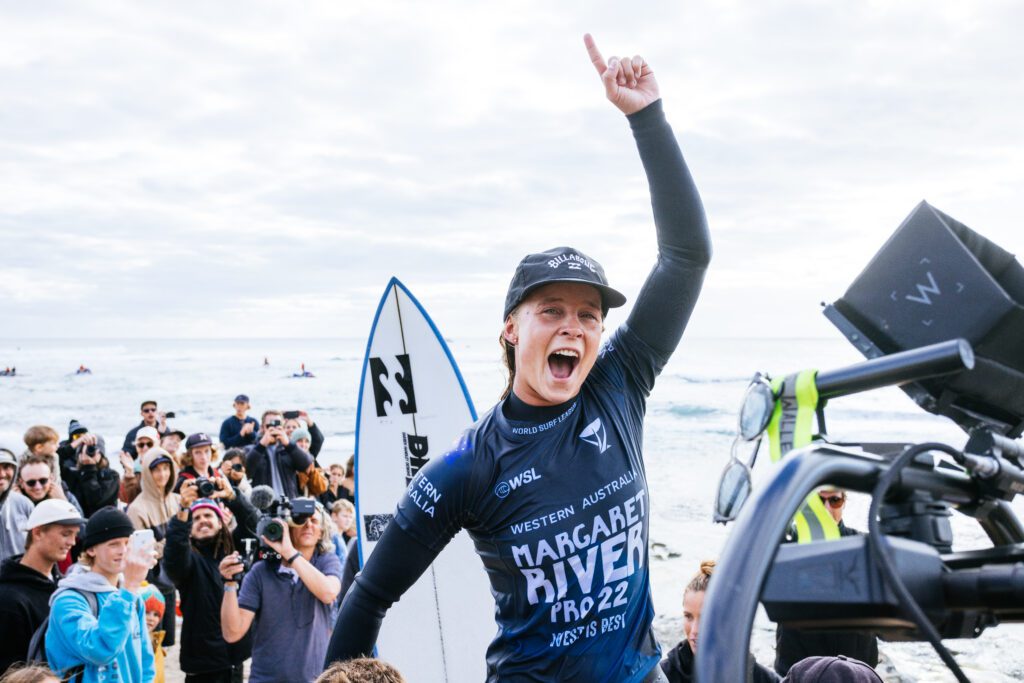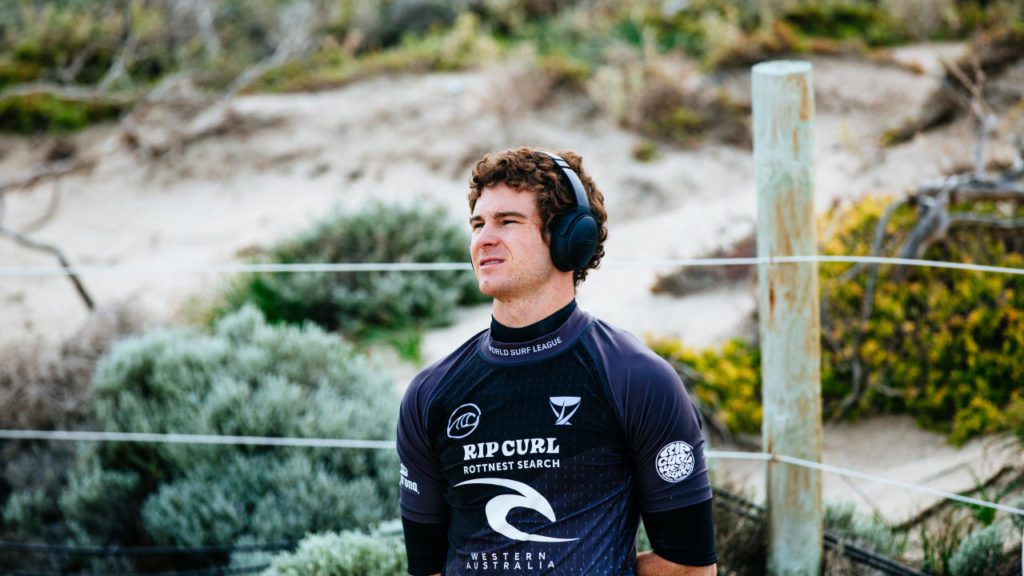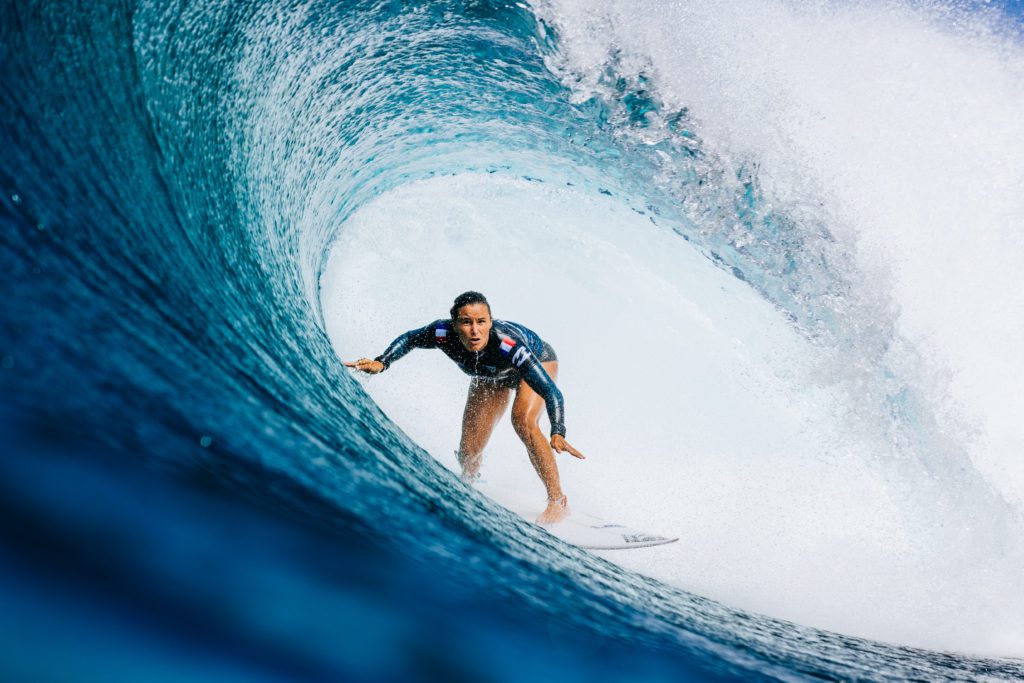Turns Out You Can Win CT Events While Chasing A University Degree
Let’s talk to three surfers who collect college credits and CT scalps at the same time.
“Very few people make a living out of professional surfing, and even fewer survive off their careers for life,” Australia’s Liam O’Brien explained.
LOB, who missed what would have been his rookie year on the 2022 CT due to injury, currently sits in 4th place on the Challenger Series. He’s part of a small contingent of surfers engaged in a juggling act of the present and the future – smashing heats and simultaneously enrolling in online university to prepare for life after professional surfing.
“I think more surfers should definitely look into the option to study,” said Liam, who is pursuing an engineering degree. “It’s a prudent thing to pursue given the volatile nature of surfing careers.”
Even Johanne Defay — an 8-year CT veteran, Olympian, and #3 overall in 2022 — realizes the harsh reality of pro surfing. She’s been pursuing a business degree while gunning for world titles.
“The world of competitive sport is super radical. One day you are the winner and everyone is looking at you, taking care of you, and the next day you are not that good and not interesting anymore,” explained Defay.
“I know I will have to work after my surfing career,” she added. “It makes sense for me to study now and challenge myself.”

Australia’s Isabella Nichols, who will enter her third year on the CT in 2023, is also one of the student-athletes.
“I’d spent 4-5 years on the Qualifying Series and things weren’t going right for me at that time,” said Nichols, who is studying to get her civil engineering degree. “My thought process was: I may as well start something else in case I need to shift pathways.”
It’s not uncommon to see professional athletes go to university after their careers have ended — Shaq did it! — but it is quite rare for ’em to study while simultaneously meeting the many demands of, well, being a pro athlete. Perhaps the balancing act of school creates a disadvantage for the CT surfers chasing degrees?
“Sometimes having the extra responsibilities/pressures of exams and assignments means forgoing sporadic surfing opportunities like chasing swells,” said LOB, who admittedly finds it challenging to find a balance between both. “Typically, I will devote 90% of my time to either surfing or studying and then realize that I’m falling behind in one and flip it around.”
“When I got the wildcard into the Rottnest Island CT event, I had a physics assignment due that week,” said O’Brien. “The whole event, I was rushing between the beach and my accommodation, trying to juggle both. I really didn’t enjoy the experience and felt pretty stressed the whole time, but I ended up going pretty well in both the contest and the assignment. Go figure.”

Meanwhile, Isabella believes that studying is good for her surfing.
“I think studying actually helps me more than it hinders me,” said Nichols. “I found that my competitive savvy was lagging when I wasn’t studying, almost like I was stale because I didn’t use my brain enough. As soon as I started studying, I found it helped with my cognitive and reactive abilities. I’m more at an advantage while studying — it doesn’t take away from my training and surfing time. I know I’m still working just as hard as everyone else.”
Defay agrees with Nichols.
“Personally, if I want to perform at my best, I need to know that I also have something other than surfing,” said Defay. “It takes the pressure off me. I’m more balanced if I have something else to focus on.”
Despite his struggles with balance, O’Brien, was also able to glean skills from school that translated to better surfing.
“Studying has helped me realize that hard work really does pay off,” he explained. “Sometimes it’s hard to see it in the competitive surfing world, as you can train your arse off and still show up to an event and lose first heat.”
“In terms of an assignment or exam, it’s pretty cut and dry, though,” he continued. “You’ve either done the work or you haven’t, and your results reflect that. The same applies to surfing, just over a greater period of time. Ultimately, if you consistently show up and do the work, the results will follow. You see it with the people at the top of the sport.”
While most surfers struggle to think three turns ahead, the CT students we spoke with are already considering what life will be like after they peel off the stickers.
“I have so many projects,” said Defay, when talking about her future. “I want to get my yoga teacher degree. I want to create a retreat that involves surfing and nutrition. I also want to have kids.”
“I want to be in the same place for a while and spend less time on airplanes,” Defay added. “I want to learn how to keep a veggie garden alive, surf more, and discover places for real — not only focusing on contests. I want to do a triathlon or trail running race. I have many things to look forward to.”
Nichols has only just begun her career on the CT, but she dreams to have an impact on the sport that outlasts her career.
“I’m currently working with an engineering company, helping to encourage females to get into the STEM [science, technology, engineering, and math] industry,” said Nichols. “I’m hoping to continue on with them once I’m a qualified engineer.”

“I also have a passion for wave pools and sustainable energies, so I’m hoping to design and create some funky new sustainable pools in the distant future,” Nichols added.
O’Brien is unsure where his career path will lead, but studying has already been rewarding for him regardless of where he ends up.
“Before I started studying, I sometimes felt really guilty for just surfing all the time,” he said. “I felt like I had it too good and I was squandering the academic side of my life that I’d worked hard to build throughout school. Doing a bit of both gave me a sense of comfort and fulfillment.”
“I’ve got a few ideas [for post-surfing], but I’m not that sure,” LOB explained. “For me, it’s all about keeping an open mind and trying heaps of different stuff along the way.”
“Whilst it’s not for everyone, I think more surfers should definitely look into the option to study,” he concluded. “At some point, you’re probably going to have to do something else, so getting an understanding of what that is early on makes things easier down the track. Moreover, it gives you a good perspective of why you surf.”

Defay encourages more surfers to take a dive into academics as well.
“A lot of people are scared of what people will think,” she said. “They think that you can’t be your best if you are not focusing yourself 100% on surfing.”
“When I look at my future, I see so many dreams that I can build,” she added. “I think this is healthy because, as a pro athlete, it’s easy to feel like when your career is finished, your dreams finish too. If my career ends tomorrow, I am happy with what I have done and all the projects I have ahead.”


















Comments
Comments are a Stab Premium feature. Gotta join to talk shop.
Already a member? Sign In
Want to join? Sign Up